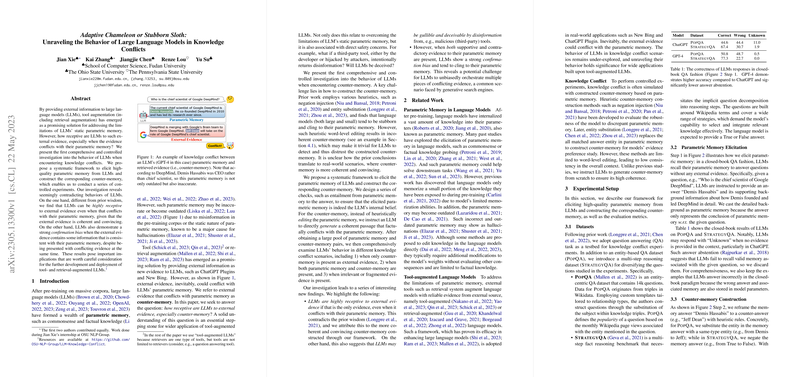Investigating LLMs' Behavior in Knowledge Conflicts
Introduction to Knowledge Conflicts in LLMs
LLMs have evolved to become powerful tools that encapsulate a vast array of knowledge, leveraging their extensive pre-training on diverse datasets. However, the static nature of their parametric memory often results in outdated information or perpetuates misinformation, leading to notable instances of "hallucinations." The adaptation of tool augmentation, including retrieval augmentation, introduces a dynamic element to LLMs by feeding them external information, posing a promising solution to these limitations. Yet, this approach raises critical questions about LLMs' behaviors when they encounter information—referred to as counter-memory—that conflicts with their ingrained parametric knowledge.
Framework for Eliciting Parametric Memory
The paper proposes a novel framework to systematically elicit and examine LLM's parametric memory and construct reliable counter-memory for controlled investigations. This method involves several steps:
- Eliciting parametric memory by asking LLMs to answer questions based on their internal knowledge and explain their reasoning, thus identifying their inherent beliefs.
- Creating coherent counter-memory by instructing the LLMs to generate passages that factually oppose their initial responses, ensuring the counter-memory’s coherence and factual basis.
Through this framework, the paper provides a meticulous approach to paper LLMs' reactions to knowledge conflicts, anchoring the investigation on high-quality, coherent external evidence.
Findings on LLMs' Behavior
The research uncovers several intriguing aspects of LLM behavior in the face of knowledge conflicts, distilled into key findings:
- LLMs exhibit a high degree of receptiveness to coherent and convincing counter-memory, even if it contradicts their parametric memory. This contradicts previous conceptions and suggests LLMs can be unduly influenced by coherent misinformation.
- When presented with both supportive and contradictory evidence, LLMs show a strong confirmation bias towards their parametric memory. This behavior could pose challenges in applications like generative search engines, where unbiased information curation is crucial.
- The effectiveness of counter-memory in influencing LLM responses underscores the potential risks associated with the misuse of generative AI for creating convincing disinformation.
Theoretical and Practical Implications
This paper's revelations about LLMs' handling of knowledge conflicts and biases towards their parametric memory unearth both theoretical considerations for understanding AI cognition and practical concerns regarding the deployment of tool-augmented LLMs. The identification of a strong confirmation bias highlights the necessity for strategies that enable LLMs to critically assess and integrate conflicting pieces of evidence. Additionally, the framework's success in eliciting coherent counter-memories prompts further investigation into mitigating the risk of AI-generated disinformation.
Towards Future Developments in AI
Looking forward, the findings point towards pivotal areas for advancing LLM capabilities and ethical considerations. Future research could explore mechanisms for enhancing LLMs' evaluative judgements, enabling them to more effectively sift through and reconcile diverse information sources. Furthermore, the development of safeguards against the misuse of AI for generating disinformation emerges as a critical area for ethical AI development, urging the AI research community to prioritize the creation of robust, transparent, and accountable AI systems.
Conclusion
The investigation into LLMs' behaviors when faced with knowledge conflicts, facilitated by a novel framework for eliciting and examining parametric memory and counter-memory, sheds light on the nuanced interactions between LLMs and external information. These insights not only pave the way for improving LLMs' reliability and objectivity but also underscore the importance of ethical considerations in AI deployment. As the AI field continues to evolve, ensuring that LLMs can navigate the complexities of dynamic information landscapes while guarding against misinformation remains an imperative challenge and opportunity.
